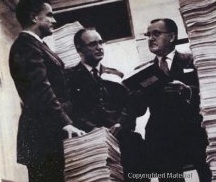From Sovietology to Jihadology?
Dec 10th, 2009 by MESH
From Walter Laqueur
 David Engerman is the author of a new study of American Sovietology during the Cold War and its impact on U.S. policy. In a recent article in Foreign Affairs he expresses his belief that the model of Sovietology should guide the study of today’s threats, specifically Jihadism.
David Engerman is the author of a new study of American Sovietology during the Cold War and its impact on U.S. policy. In a recent article in Foreign Affairs he expresses his belief that the model of Sovietology should guide the study of today’s threats, specifically Jihadism.
It is true that the United States greatly helped the emergence of Sovietology in its early phases by financing research centers, the publication of the Current Digest of the Soviet Press and other useful tools. As a result, Soviet studies did not just serve the immediate interests of government but gained respect by making serious scholarly contributions. Engerman is also right in stressing the importance of studying cultures and not just “threats.” Many of the first generation of Soviet experts were deeply steeped in Russian culture, but such interest and knowledge predated U.S. government educational initiatives. Such wide, often passionate, interest in Russian cultural traditions (think for instance of Alexander Gerschenkorn) could not be taken for granted as far as later-day Soviet experts were concerned.
The subsequent story of American Sovietology was somewhat less inspiring. In the late sixties and the years after, the belief gained ground that the Soviet system was a developmental dictatorship of social justice aimed at making the Soviet people not only more prosperous but also freer. Books appeared claiming that Stalinism had many positive aspects because it had carried out a cultural revolution. Anyway, the purgers and the Gulag had been greatly exaggerated; only relatively few Soviet citizens had suffered or lived in fear. Altogether, the Soviet system was more democratic and less aggressive than a previous prejudiced generation of Sovietologists had thought. It was a different kind of democracy, and while still somewhat behind the Western living standards, it was gradually catching up. In brief, the West had a great deal to learn from it.
Of course, such views were not shared by all Sovietologists, and it is also true that during this period they had hardly any influence on the shaping of U.S. policy. (But it should not be forgotten that even CIA in these years greatly overrated Soviet economic performance.) In brief, the story of academic Sovietology, with all its achievements, is also a story of pitfalls of every kind and misjudgments. In a recent memoir, I have tried to explain why things in this and other area studies can go wrong.
So Engerman means well, but he underrates the problems arising when the attempt is made to transfer the model of Sovietology to Jihadology (even if we use the less offensive term political Islam). There is bound to be resistance from the very beginning. Is this a legitimate field of study, it will be asked, or a mere construct by Islamophobes? Even if such a field exists, would its study not generate more friction and conflict at a time when sympathy and an effort to understand are needed? Are Westerners at all capable (post-modernists and post-colonialists will argue) to understand cultures and belief systems that are not their own? What would be the point of republishing in translation the material generated by political Islam? It would be only grist on the mills of the Islamophobes, incapable of understanding its real meaning and simply using it for hostile propaganda. Would not collaboration with the U.S. government fatally compromise the bona fides of Middle Eastern and Islamic studies?
On occasion, Soviet studies—despite an endeavor to be objective and even “scientific”—became emotionally charged. But this cannot even begin to compare with the supercharged climate that has prevailed for some time in the mainstream of Middle Eastern and Islamic studies. What Engerman suggests may still be possible, but those who engage in it should be aware of the enormous resistance they are likely to encounter.
 Posts+Comments
Posts+Comments Posts+Comments
Posts+Comments Posts+Comments
Posts+Comments Posts+Comments
Posts+Comments